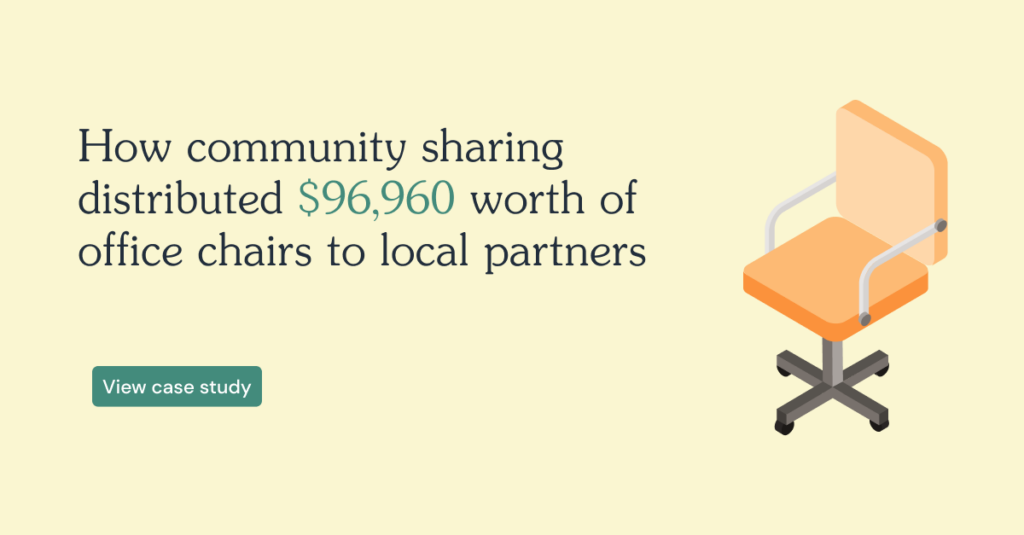Sustainability Consulting Services
Rheaply puts reuse on the table for every organization.
Sustainability Consulting Services
Sustainability is an important consideration in business which has received a lot of attention as of late. The reasons for this might be numerous, but a few compelling reasons might come to mind quickly–sustainability practices can help organizations improve their impact around them, as well as cut costs. As this can be a major win-win scenario for many organizations, sustainability might be an important focus.
Still, engaging in sustainable practices and operations can be a tricky move, and it can be difficult to even know where to start. Here’s where sustainability consulting services come in; sustainability consultants can help organizations better understand sustainability as well as provide actionable insights and advice about sustainability.
While sustainability in business might refer to sustainability from an environmental standpoint, sustainability can take a wider focus than simply environmental sustainability. Social sustainability and cost-effectiveness are also potential goals of sustainability efforts. As such, sustainability consultants might look at operations across many parts of an organization. Sustainability consultants might also offer help to companies that seek to engage in or improve their sustainability reporting.
This can be like an open dialogue with the public regarding business practices from a sustainability standpoint, and sustainability reporting consultants can help companies and other organizations improve their sustainability reporting, whether it’s mandated by regulatory agencies or a voluntary initiative to improve sustainability practices.
One of the focuses of the 21st century for many organizations as well as their supporting partners, customers, clients, and shareholders, is on environmental sustainability. Many people find themselves increasingly concerned with global climate change, pollution, and unsustainable business practices. As such, organizations are moving to increase their environmental sustainability and reduce pollutants as well as their carbon footprint.
Carbon footprint analysis and environmental impact assessments are some of the ways organizations might gain a better understanding of their overall environmental impact. These are some of the services sustainability consultants might offer organizations in order to help them become more sustainable overall. These types of in-depth insights enable organizations to take action to improve their environmental impact.
Finally, sustainability practices can help organizations save money and create novel cost-cutting practices. For example, organizations might change their approach to procurement–focusing on procuring reusable or reused goods in order to operate. While this is an excellent practice for reducing waste and therefore improving environmental impact, it can also be far more cost-effective than procurement practices which favor buying more new and one-time-use goods.
Types of sustainability consulting
There are several types of sustainability consulting. While some might focus primarily on matters such as environmental sustainability, others might focus on social sustainability. And, sustainability consultants operate in varied capacities as well as with different focuses. For example, some sustainability consultants might offer organizations services such as analytics and testing in order to provide an organization with actionable data, while a strategic sustainability consultant might also offer help developing strategies collaboratively with team members within the organization. In some instances, sustainability consultants may take a hands-on approach to implementation.
Corporate sustainability consulting deals with helping companies specifically enact, improve, or implement sustainability practices. Sustainability consultants might help organizations with sustainable business model development as well, whether they’re relatively young companies seeking to practice sustainability or existing companies that seek to revamp their business model in order to increase sustainability.
Environmental sustainability consultants might focus exclusively on environmental impacts, while other sustainability consultants might focus more broadly on matters such as supply chain sustainability and social sustainability. In any of these cases, sustainability consultants might operate in various capacities–offering advice or helping organizations make assessments or maybe playing a hands-on role in developing and implementing sustainability strategies.
What is sustainable supply chain management?
To many organizations, supply chain management is an important, often crucial, consideration. Yet, supply chain management often might not focus on long or even short-term sustainability; for some, the primary focus might be efficiency or cost-effectiveness. Despite this, sustainable supply chain management holds the potential to become a route toward increasing efficiency and cost-effectiveness as well. Many of the problems with supply chain sustainability stem from participation in a linear economy. Products are produced, distributed, used, and then discarded.
This can result in excessive waste and the unnecessary production of waste products and might even be far less cost-effective than supply chain management which focuses on sustainability and creating a circular economy wherein goods are reused, repurposed, and recycled.
This focus isn’t only environmentally conscious; it can also help organizations cut down costs normally associated with procurement. So, what is sustainable supply chain management? Sustainable supply chain management is:
- Cost effective: When organizations focus on sustainable procurement, production, and use, they can find opportunities to cut down costs. Whether through internal reuse of resources, the sale of excess resources to external entities, or seeking of second-life goods and resources, organizations that focus on sustainability in supply chain management may find that they can operate with increased efficiency and lower costs.
- Environmentally conscious: Organizations which seek to reduce their environmental impact, or improve it, might find that supply chain management is an effective place to start. While assessments and tests performed by environmental sustainability consultants are an excellent way to understand an organization’s environmental impacts more clearly, taking steps to mitigate environmental impacts might very often involve reexamining the ways an organization procures, sells, or uses goods within a larger supply chain.
- Efficient: an organization reexamining its relationships with the supply chain can help it increase efficiency at various levels of operation. When it comes to sustainability in logistics and supply chain management, organizations might find that by taking a focus on sustainability, they inadvertently streamline essential processes, creating a more efficient, overall, system.
For example, rather than discarding usable resources that may now be of more use to another team, through internal reuse, organizations may find they’re able to cut costs associated with procurement and waste management at the same time. Small enhancements to efficiency across vast systems may translate to leaps in efficiency over time. This can potentially come with additional benefits; amid a global pandemic, many industries saw supply chains buckle as the market rapidly changed. By increasing efficiency throughout the supply chain, organizations of the future may be able to mitigate these types of risks.
Importance of sustainability in your supply chain
Sustainability in the supply chain is important for numerous reasons–not the least of which being that increasing sustainability to supply chains can increase efficiency and cost-effectiveness of supply chains. In the long run, this can help enhance the ability of organizations within the supply chain to weather potential future storms and increase efficiency in operations. The importance of sustainability in supply chains goes beyond practicality, however.
For many organizations, the strongest link to the supply chain is in their procurement practices. Sustainable procurement might aim to reduce inefficiencies and cut costs as well as improve environmental impacts of procurement. Practices such as reuse and repurposing can help organizations avoid making new purchases as well as lower the costs associated with purchases, but the benefits of sustainable procurement and supply chain management practices can go beyond the simple economic benefits of sustainable procurement; by producing less waste, and procuring goods and resources that are more inherently sustainable, the impacts of sustainable supply chain management can potentially include significant improvements to environmental impacts. By more efficiently utilizing resources throughout the supply chain, the need for production can be lessened, leading to larger changes. What’s more, by focusing on sustainable procurement, organizations can offer economic incentive to manufacturers to produce more sustainable goods, which may be recyclable, reusable, or have a reduced carbon footprint. Over time, if many organizations shift their focus to sustainable procurement and supply chain management practices, supply chains may see a cascading effect of environmental impact improvements.
Future of sustainability consulting
The future of sustainability consulting looks bright, as many increasingly adopt sustainable practices. We may see further evolutions of technologies that enable organizations to adopt and maintain sustainable business practices, as well as further adoption of sustainability practices. Sustainability technology and innovation will enable the next generation to make new leaps.
Novel materials such as bioplastics, and biofuels can reduce the environmental impacts, while expanding software capabilities can enable organizations and consultants to run more in-depth analyses and make predictions that will help organizations more efficiently and effectively take steps toward sustainability.
Some of the same technologies that are in their relative infancy now, such as nanotechnology, novel energy storage, and certain renewable energies, will likely continue to develop, further enabling businesses to reduce their carbon footprint, minimize their environmental impact, and operate more efficiently.
We’ll likely see a sustainability consulting shift to embrace advances in technology that can bring desired outcomes, and the procurement consultants of tomorrow will likely utilize more and more advanced technologies, such as AI and machine learning powered softwares, capable of illuminating important patterns and making predictions. As well, novel technologies that enable manufacturers and suppliers to create more environmentally sustainable products will likely see widespread adoption as more and more organizations see the benefits of sustainable practices and follow suit.


